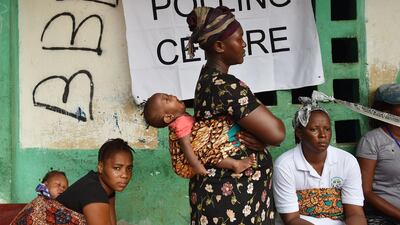Sierra Leone voted in a general election on Wednesday, as President Ernest Bai Koroma prepared to step down after two consecutive terms.
Before dawn queues had formed at the polling stations, as election fever swept the struggling West African country.
But with 16 presidential candidates on the ballot requiring 55 per cent of the vote, observers are predicting a run-off later this month.
“There might be 16 presidential aspirants but only three have a chance of winning,” said Jamie Hitchen, director of Africa research firm AREA Consulting.
Mr Koroma has anointed former foreign minister Samura Kamara of the ruling All People’s Congress (APC) as his successor. Supported by Chinese businesses with stakes in the country, he is the favourite.
“When an APC rally through the city centre is marked by supporters waving large Chinese flags, not many questions need to be asked,” said Catherine Bolten, a professor of anthropology at Notre Dame University.
Meanwhile Julius Maada Bio of the opposition Sierra Leone People’s Party (SLPP), who led a three-month junta government in 1996, has campaigned on promises of free universal education.
Both are steeped in scandal. While Mr Bio is accused of stealing $18 million (Dhs66.1 million) from state coffers in 1996, Mr Kamara has attracted the epithet “Mr 10 per cent”, following accusations of skimming from government contracts.
_______________
Read more:
Liberians hail victory of ex-football star Weah in landmark vote
Sierra Leone's Peace Diamond: how the gem made its way from mud to marketplace
Death toll from Sierra Leone mudslides rises above 400
Comment: How Sierra Leone is rebuilding after the disaster of Ebola
_______________
Elections have traditionally fallen along ethnic lines, creating a two-party hegemony in a country still scarred by a brutal civil war from 1991 to 2002.
But this year the National Grand Coalition, formed just three months ago and led by former UN diplomat Kandeh Yumkella, has rejuvenated Sierra Leonean politics, mobilising disgruntled voters across ethnic lines and shifting the discussion to policy.
All candidates agreed to suspend hostilities amid small-scale skirmishes, with a public “peace pledge” prior to the elections, which the African Union and others are expected to observe.
With more than 3.1 million people registered to vote, turnout is expected to exceed the 2012 record of 87 per cent.
Back then, Sierra Leone was a regional leader in education and Africa’s fastest growing economy, prized by international investors for its abundant iron-ore.
But in the following years its economic fortunes faltered.
A global commodities crash in 2013 closed the country’s main iron-ore mines, sending the economy into free-fall. And in 2014 an Ebola outbreak left more than 4,000 dead, including hundreds of health workers.
Today, just 200 public doctors serve the country’s 7 million people.
Currently two-thirds of the population are either jobless or underemployed in a country plagued by corruption.
Observers from the African Union, Economic Community of West African States (ECOWAS), the European Union and the British Commonwealth are all overseeing voting.
In a joint statement they urged security forces "to demonstrate professionalism and to enforce the law in a neutral and proportional manner," in a country where the police are frequently accused of brutality.
The results, which are expected to be announced in the coming days, could have wider significance.
“West Africa has seen three peaceful transfers of power between political parties in the last 16 months, in Ghana, Gambia and Liberia,” said Mr Hitchen. “Sierra Leone could be a fourth.”

